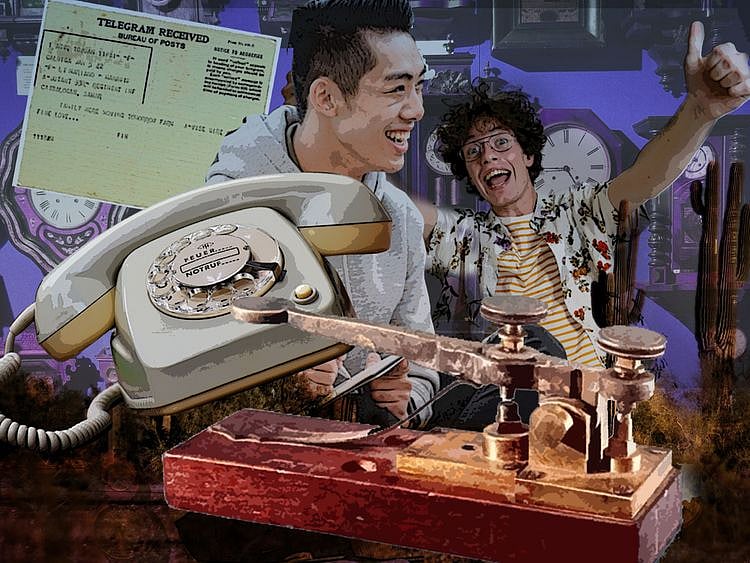Rotary phone and telegram, when communication was a challenge
Dubai-based expatriates share their memories from a bygone era

Handwritten letters, fountain pens, rotary phones, typewriters, Walkman, film cameras, VHS tapes -- are these the stuff of the yesteryears? An essential yesterday, forgotten today? Have they lost their charm and utility over time, leaving just lingering memories?
A rotary phone that was all the rage in a Mexican village before the advent of the mobile phone; a telegram that brought happiness - obsolete gadgets, habits and their impact in bygone eras make for a fascinating recall. Check them out – with a piece of history and some quirky facts.
Here is the first in a six-part series of stories.
Hello, we waited for days to make or receive a call!
By Seyyed de Llata, Senior Designer
We carry our phones everywhere, from the dining table to the toilet, we live in an always-connected world, but it wasn’t always like that.
In the mid to late 80s telephones were not a common gadget in Mexico, not even in the cities. You could find one or two landlines per block. In the farming village where I grew up, there was only one landline. That was and still is 4 by 7 blocks, with a population of less than 700 in the good old days.
The place is called Martin Rocha, Tamaulipas (Google it, though no street view is available). It is 6 kilometres of dirt roads until the highway, 12 km to the next town, 60 km to a city with a doctor and is surrounded by cornfields, inhabited by falcons, rattle-snakes and cactus.
The Rotary dial phone was installed in the only drugstore in the vicinity, and it was one of the most important landmarks in the village, its bell is second to the old church. If you needed to make a phone call or receive one, you had to make an appointment.
Date and approximate time had to be carefully scheduled in a log, managed by the owner of the drugstore. The drug store owner would give you a 30 minutes window to call (or receive a call), and hopefully, the person you called would be reachable, because they, as well, did not own a landline and must have made an appointment with a neighbour or office around their place.
People would call and ask to convey a message: “Please tell Professor Alfredo (that’s my dad), that his brother Luis called. Call back at 555-XXXX next Wednesday around 3 PM."
It was an interesting event to watch and observe the handset of the Rotary phone being lifted: “jhashhhhhh… tk,tk,tk… jhashhhhh, tk,tk,tk,tk,tk” made by the disk… the silence before the “Bueno…”; as well as the excitement when it rang, “Who is calling, to whom, is it super important?”
As kids, we were more than happy to run like a wild pack to deliver the message in a little piece of paper to one summoned to the mystical gadget.
It was good business for Pedro, the drugstore owner: you have to pay a few pesos for the message, a few more for calling, each time, and then of course for the soft drinks and little snacks you bought while waiting.
People gathered there, every day, waiting to receive or make a call, and then talking about it with the neighbours. Each call was important.
Imagine waiting for a few days to make a call, just to be told the person you are looking for will call you next day or next week?
A telegram that brought happiness packed in a red plastic cover
By Jay Hilotin, Senior Assistant editor
Where I grew up, the nearest phone or calling booth was an hour away. For many decades, telegraph lines were ubiquitous in the cities and countrysides. Around February 1987, months before my final year in high school ended, my parents received a telegram late afternoon. Can’t remember whether it was RCPI (Radio Communications of the Philippines Inc.) or PT&T (Philippine Telephone and Telegraph). I still vaguely recall the colour — red — of the plastic cover. The telegram had a message from the university registrar’s office, noting that I had passed the entrance exam given months earlier, and must report by a certain date to keep my scholarship slot. I think my Papa was well pleased with that news. Later, on one occasion, I clearly remember him drawing a rotary phone dial on a piece of paper — using a round plastic lid for his guide, to demonstrate to me how to place a call. In college, I did most of my term papers initially using a portable typewriter. It was hard labour. During the latter part of my university years, computers started to emerge.
PT&T and RCPI still trigger memories—both good and bad—on how important the telegraph was before smartphones came. The erstwhile ubiquitous telegraph lines are no more. Till then, they were our only links to the whole wide world.
RCPI, founded in 1958, saw a management buy-out in 2005, and the company changed its name to Universal Storefront Services Corp (USSC), which has 1,600 stores and sub-agents all over Philippines, remittance services and the number one agent of Western Union in the Philippines. PT&T, founded in 1962, has turned into an internet broadband service provider.
Tomorrow: A letter to remember and a fountain pen that made all the difference...
Sign up for the Daily Briefing
Get the latest news and updates straight to your inbox
Network Links
GN StoreDownload our app
© Al Nisr Publishing LLC 2026. All rights reserved.